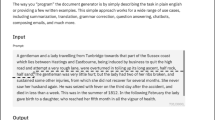Abstract
In this paper, which motivates lexical acquisition, we explain why existing lexicons are not complete and describe the impact of lexical gaps. We survey acquisition methods relative to their required resources and show that learning algorithms must be designed so that they rely on resources that are technologically available. We discuss in this light the availability and accessibility of machine-readable dictionaries and corpora. Finally we investigate the aspect of lexical semantics, addressing the question, What is the resource from which lexical semantics can be acquired? The answer is not clear because semantics is nowhere to be found explicitly. Thus, we resort to learning semantics by bootstrapping from secondary clues.
Similar content being viewed by others
References
Berwick, R.C. 1985. The Acquisition of Syntactic Knowledge. Cambridge, MA: MIT Press.
Boguraev, B., and T. Briscoe. 1988. Large Lexicons for Natural Language Processing. Journal of Computational Linguistics, Special Issue on the Lexicon.
Chomsky, N. 1965. Aspects of the Theory of Syntax. Cambridge, MA: MIT Press.
Choueka, Y. 1988. Looking for Needles in a Haystack. In Proceedings of the RIAO, Boston.
DeJong, G. 1977. Skimming Newspaper Stories by Computer. Research Report 105, Department of Computer Science, Yale University.
Granger, R. 1977. Foulup: A Program that Figures Out Meanings of Words from Context. In Proceedings of Ijcai-77, Cambridge, MA.
Herskovits, A. 1985. Semantics and Pragmatics of Locative Expressions. Cognitive Science, 9:341–378.
Jacobs, P. 1989. Making Sense of Lexical Acquisition. First International Language Acquisition Workshop (Ijcai), Detroit.
Jacobs, P. and U. Zernik. 1988. Learning Phrases from Text: A Case Study. In Proceedings of the Seventh National Conference on Artificial Intelligence, Los Altos, CA: Morgan Kaufmann.
Klavans, J., M. Neff, B. Boguraev and R. Byrd. 1989. From Machine-Readable Dictionaries to a Lexical Knowledge Base. First International Language Acquisition Workshop (Ijcai), Detroit.
Krovetz, R. 1989. Lexical Acquisition and Information Retrieval. First International Language Acquisition Workshop (Ijcai), Detroit.
Lakoff, G. and D. Johnson. 1980. Metaphors We Live By. Chicago: University of Chicago Press.
Levin, B. 1987. Approaches to Lexical Semantic Representation. In D. Walker (Ed.), Lexicon Workshop: LEX. Stanford: CSLI.
Lytinen, S., and S. Roberts. 1989. Lexical Acquisition as a By-Product of Natural Language Processing. First International Language Acquisition Workshop (Ijcai), Detroit.
Martin, J. 1989. Representing and Acquiring Metaphor-Based Polysemy. First International Language Acquisition Workshop (Ijcai), Detroit.
Mel'čuk, I., and A. Polguere. 1988. A Formal Lexicon in Meaning-Text Theory. Computational Linguistics 13.
Norvig, P. 1989. Building a Lexicon with Lexical Network Theory. First International Language Acquisition Workshop (Ijcai), Detroit.
Pinker, S. 1984. Language Learnability and Language Development. Cambridge, MA: Harvard University Press.
Procter, P. (Ed.). 1978. Longman Dictionary of Contemporary English. Harlow, England: Longman.
Schank, R.C., and R.P. Abelson. 1977. Scripts, Plans, Goals, and Understanding. Halsted, NJ: Lawrence Erlbaum.
Selfridge, M.G.R. 1986. A Computer Model of Child Language Learning. Artificial Intelligence 29.
Smadja, F. 1989. Macrocoding the Lexicon with Co-Occurrence Knowledge. First International Language Acquisition Workshop (Ijcai), Detroit.
Stallard, D. 1989. Unification-Based Semantic Analysis in the Bbn Spoken Language System. In Proceedings of the Darpa Speech and Natural Language Workshop. Los Altos, CA: Morgan Kaufmann.
Zernik, U. 1989. Lexical Acquisition: Learning from Corpus by Capitalizing on Lexical Categories. In Proceedings of Ijcai-89, Detroit.
Zipf, G.K. 1949. Human Behavior and the Principle of Least Effort. Reading, MA: Addison-Wesley.
Author information
Authors and Affiliations
Rights and permissions
About this article
Cite this article
Zernik, U. Lexical acquisition: Where is the semantics?. Machine Translation 5, 155–174 (1990). https://doi.org/10.1007/BF00393759
Issue Date:
DOI: https://doi.org/10.1007/BF00393759




